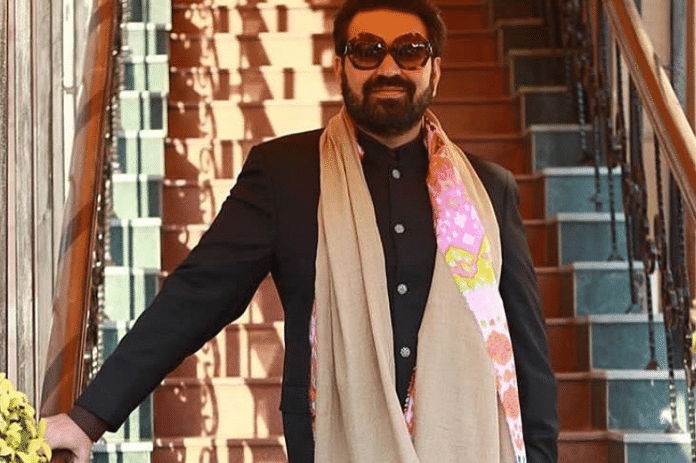The launch of the Keshav Suri Foundation saw five panel discussions on how corporates, the media, and politics can be widened to include LGBTQIA people.
New Delhi: “Did any of you feel awkward today?”, Keshav Suri, hotelier and one of the people whose petition led to the reading down of Section 377 of the Indian Penal Code, asked Saturday.
The audience he was addressing at the launch of the Keshav Suri Foundation consisted of a crowd of nearly 250 vibrantly-dressed persons, many of whom belonged to the LGBTQIA community. Their answer was a resounding “no”.
Also read: Legalising gay sex expected to boost India’s ‘Pink Economy’
“If you weren’t made to feel like an outlier today, then that’s a step towards inclusion for me,” Suri continued, indicating what his foundation would work towards.
The Keshav Suri Foundation “aims to create a platform that will enable people from the LGBTQ community to share their stories with pride, sans judgement”. It hopes to do this by collaborating with the international It Gets Better project, wherein queer persons send in their testimonies about how the movement has helped their lives.
The foundation’s inauguration Saturday saw some of the queer community’s most prominent faces, including Laxmi Narayan Tripathi and politician Apsara Reddy.
Speaking to ThePrint, Suri said his foundation differs from others because it will focus on inclusivity through social media, until it slowly makes its way into the policy space.
“I have been fortunate to be in a position where I can walk into policy makers’ offices,” said Suri. “The human rights aspect of inclusion has now taken place with the decriminalisation (of queer sex), but ensuring other rights are given will mean appealing to the government on grounds of taxation and capital that the queer community can offer.”
The legal argument
The event saw a total of five panel discussions, all focussing on how corporates, the media, and politics can be widened to freely include the LGBTQIA population, as well as how the aftermath of the Section 377 verdict will unfold in the years to come.
“What we have to do is let this this judgement play out in public,” said Senior Supreme Court Advocate Saurabh Kripal. “Courts take steps reflecting society, but their judgements are also predictive. This judgement will change public discourse and outlooks,” he said.
However, co-panelist Satyashri Sharmila, the first transperson to enrol in Tamil Nadu’s Bar Council, differed: “Judgements don’t trickle down to the rural level so quickly. How is a policeman in a village to understand and act accordingly?” she asked.
Even within the LGBTQIA community, certain sections — particularly the kinnars or ‘hijras’ — are doubly marginalised. Laxmi Tripathi was especially vocal about this, saying: “When I went to the United States, people would look at me and say, ‘Oh look, she’s a hijra, they’re divine’, and then I would be treated like a caged animal. But it got better when I felt pride in touching our Indian flag on stage,” she said.
Also read: Who are the 6 gay people who have challenged the SC ruling criminalising homosexuality
“For so many of our sisters here, who are eager to learn, they will go back to sex work tonight because they have to pay their bills.”
Queer representation in film and media
Kinnar members of the audience were also careful to keep panellists on their toes about comments they made. In discussion with ThePrint’s editor-in-chief Shekhar Gupta about queering content spaces, filmmaker Apurva Asrani said: “When I look to cast an actor, I look for an actor who has the kind of talent I am looking for. Would I want to hire a transperson just for the sake of representation, even if they are a bad actor? I don’t think so.”
His remark was met by an angry retort from an audience member, who said transpersons are not given the same chances cis-gendered people are, and that there were exceptional trans actors, too.
Issues of queer representation were relevant across all panels, particularly when it came to media content. “There is not enough queer content being produced in the media today. Who is to blame for it? The producers of the content, or the audience?” Gupta asked the panellists.
Kusha Kapila, famous for her Billi Maasi videos mocking toxic upper-class behaviour, said: “Why should we always be so sensitive towards what the audience wants? We need to keep making queer content even if at first it is uncomfortable for audiences.”
Multiple-time award-winning filmmaker Faraz Arif Ansari agreed, saying: “If we never test the waters, how will we ever know if queer content is accepted or not?”
The solution, the panellists finally agreed, would be a mix of providing the LGBTQIA community with both access to resources and opportunities, and increasing their on-screen and representational presence. “We will have to step down from our positions of power and let them (the queer community) come on to our teams, and only then will we be able to tell their stories successfully. Otherwise we cannot,” said Kapila.
The Keshav Suri Foundation hopes to contribute to this endeavour by featuring some of the most marginalised within the queer community on its platform. Suri said: “We want to get their stories out there. We’ve already gathered 15 such stories, including a trans acid attack survivor,” he said.
The idea is to get queer stories out on the internet where they can be viewed and shared.
“Now that 377 has been read down by the Supreme Court, we will be facing the backlash, and that means the real struggle for our rights has only just begun,” said activist Anjali Gopalan.



